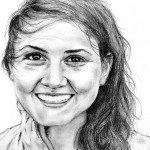I’ve run in circles since I was a kid, but when I was 18, those loops widened. That’s when I ran my first marathon. I wore tiny green shorts, ate chocolate GU energy bars and spent many miles watching the T-shirt of a bald, heavyset man stick closer to his skin. It read, “Challenge is the Point.” The point or not, challenge was present: By the time I crossed the finish line, my skin was rubbed raw, thighs dense, toenails smashed into a deep shade of purple-black. It was pure pain and pure ecstasy. I couldn’t find my family in the crowd, but strangers hugged me, gave me warm pretzels and wrapped me in a tinselly emergency blanket.
 I signed up for my second marathon the next year. I trained for a week, got pneumonia for a month, and the morning of the race, decided to run anyway — maybe do the 5K, or the half. As soon as I started I knew there was no stopping. How could I? Races are addicting. So I ran by my parents, finish line after finish line, until I plucked two Advils from my mom’s palm, and dashed away, telling them I’d see them after 26.2.
I signed up for my second marathon the next year. I trained for a week, got pneumonia for a month, and the morning of the race, decided to run anyway — maybe do the 5K, or the half. As soon as I started I knew there was no stopping. How could I? Races are addicting. So I ran by my parents, finish line after finish line, until I plucked two Advils from my mom’s palm, and dashed away, telling them I’d see them after 26.2.
I’ve been fluent in marathon-speak since then. I know how many ounces my sneakers weigh. I know that going downstairs, not up them, is what hurts after the race. I know that, besides the sculpted bodies at the front, we’re all in it together. I still talk to a few of the then-strangers who pulled me through long miles, but most of the racers I’ve run near through the years are people whose names I either never knew or have since forgotten. They have kept me returning to the start line.
I’ve kept racing — relays, half-marathons, marathons, ultramarathons. Whenever I’ve tried to explain this growing addiction to races, I’ve plagiarized — citing “collective effervescence” or quoting what others have said about testing my mind and seeing who had guts and forgetting that the rest of the world existed for a few hours. Like most things, I figured it followed the kind of reason that Hume calls “a slave to passion,” instead of the kind I can actually reason out.
I’ve been thinking about the appeal of these races much more, recently. I stayed up until 3 a.m. the night of the Boston bombing, refreshing news sites with sad eyes, feeling guilty about how little I could do and how much it affected me. Why, in a world full of so much pain, did I need a tragedy to be near and relatable to engage with it so obsessively?
I couldn’t stop thinking about how moments before the flying debris and puffing black smoke blotted out the finish line, the collective effervescence must have been fizzing on Boylston Street as those nearly finished racers imagined their postrace snack. I realized that one of the many, many reasons that the bombing was so particularly real and horrible to me was because it invaded such an idealistic space.
At races, thousands of amateur runners dedicate themselves to a very difficult task with little point. The finish line for a marathon is placed according to the distance a Greek runner over 2,000 years ago ran, and died upon finishing. For many other races, we more overtly make up the finish line. Runners brush sweaty bodies against each other, whispering as they exhale that the other can do it. After months of training, often by ourselves, we come together to run side by side, taking over streets and trails and taking care of each other along the way.
The juxtaposition of that idealistic space with a sadder one made me appreciate the magic that all races, and particularly marathons, have, and just how unlikely the spaces they create are.
I’m about to watch most of my friends finish this particular rat race (I took a semester off — I’m just faking this senior thing). We’ve been running in circles together for four years, chasing made-up finish lines, and our loops are about to widen. I’m worried about the moment after the finish line. I want everyone to be OK.
These racing spaces — full of unlikely idealism and community — reassure me, though. They have shown me that we can create these pockets of exuberant togetherness if we choose to — if we love hard and laugh hard and remember to pat each other’s sweaty backs when we run hard. Long races defy moderation. They tell us to keep running, no matter the weather, no matter the pain. I want to chase these far-off finish lines — walk, run, dance into spaces with radical idealism all life long, paying immoderate attention, giving out immoderate love, dancing with immoderate joy.
Diana Saverin is a senior in Berkeley College. Contact her at diana.saverin@yale.edu .







